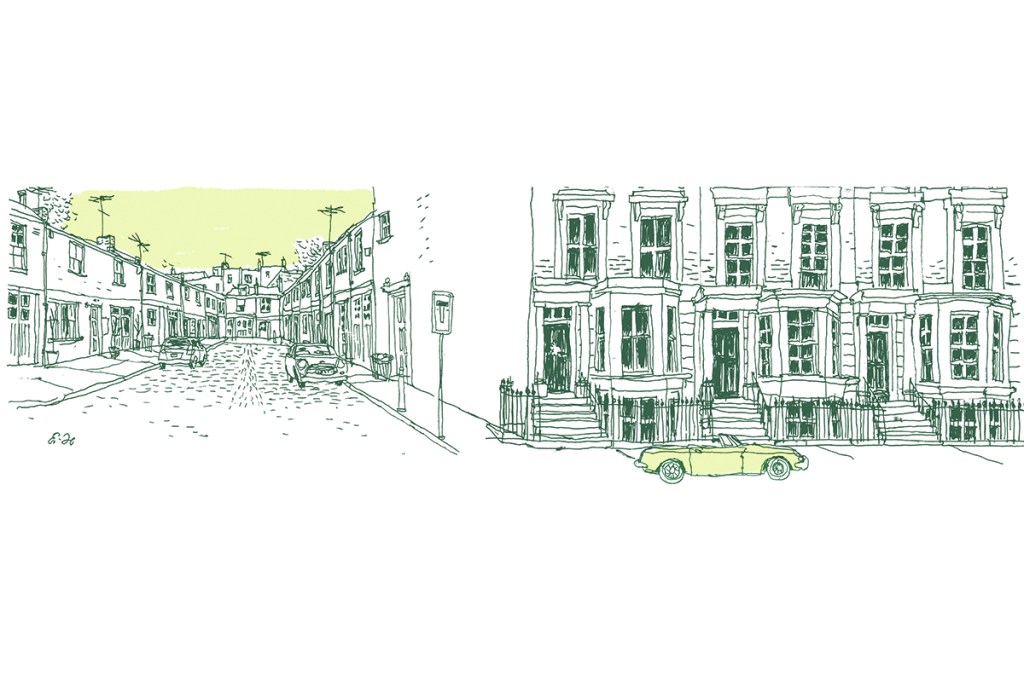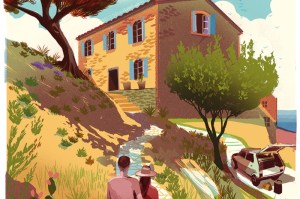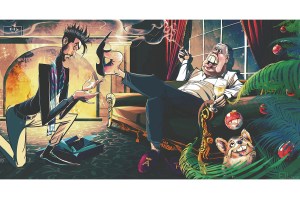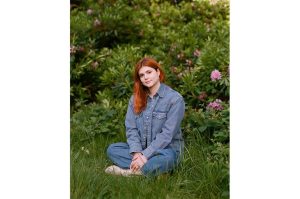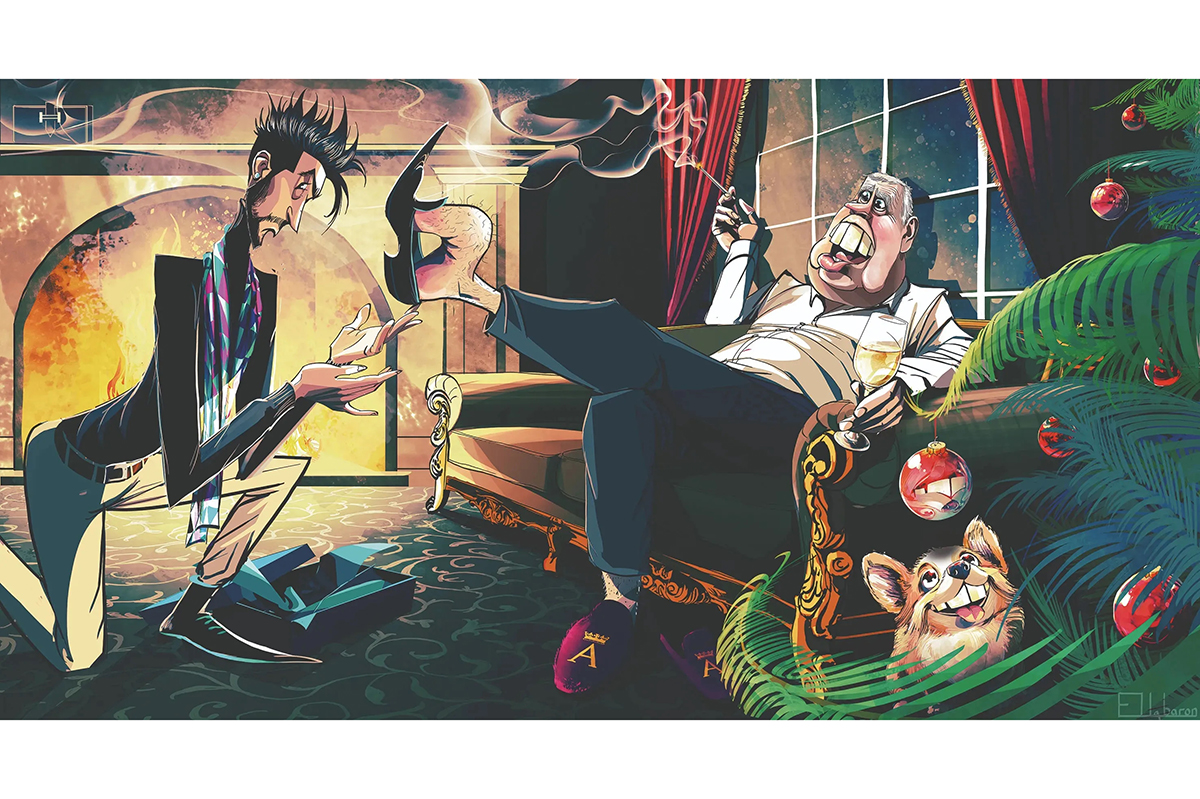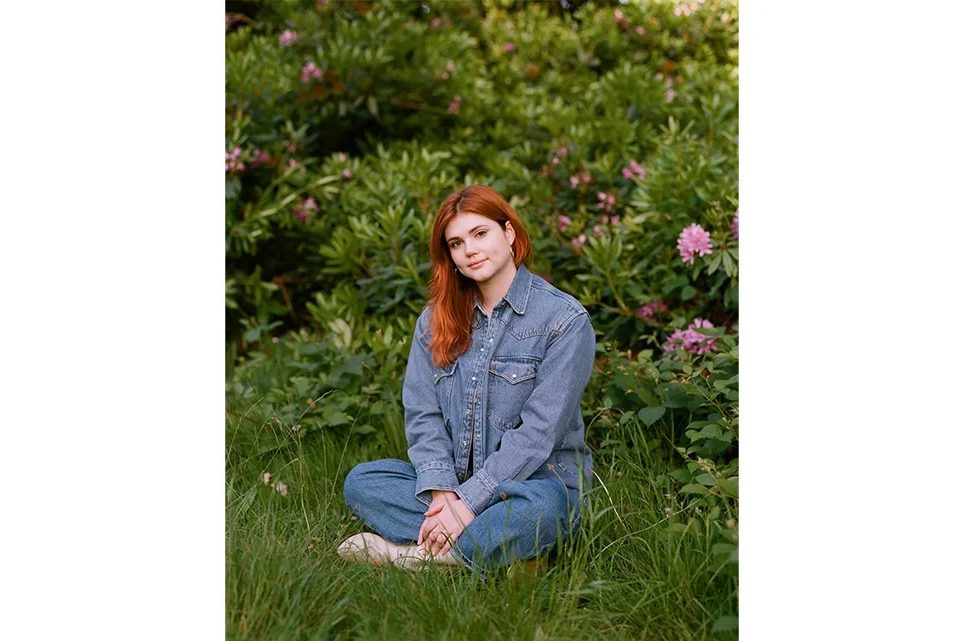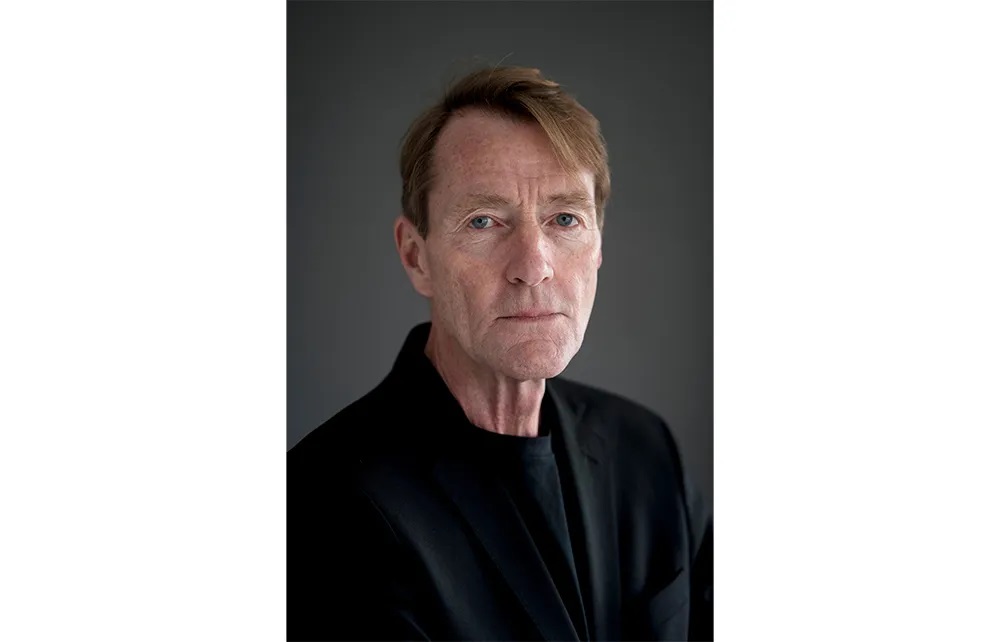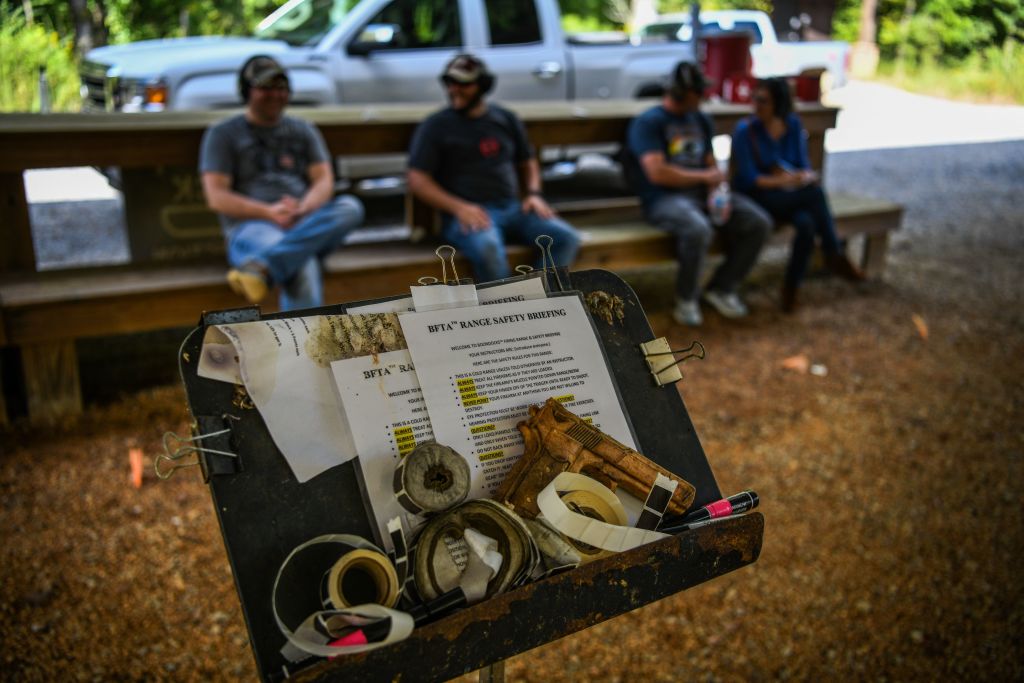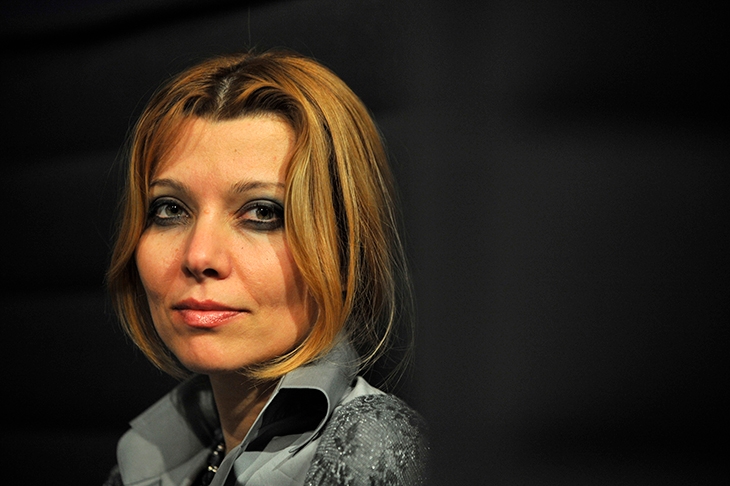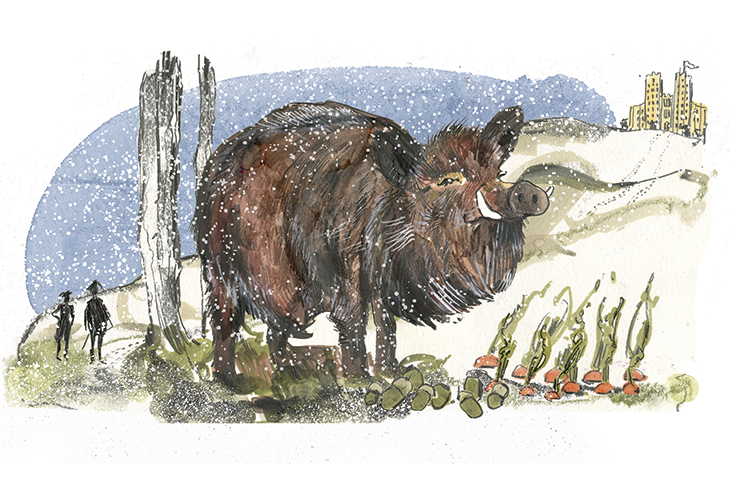Meredith Swann is driving in her new car under the M40 flyover, checking on her GPS system to see if she’s following the flowing arrows correctly. She has switched off the woman’s voice — “Turn left in 200 yards” — because it reminds her uncannily of her mother, all calm, quiet advice with a subtext of disapproval. She turns and turns again. Now she is on a road of towering glass office blocks. Is she lost? No, there it is — Sainsbury’s Homebase.
She parks, steps out of her car and pulls down her T-shirt to cover the neat dome of her pregnant belly. The car magically locks itself as she walks away, its lights giving her a knowing wink of acknowledgment.
In the vast Homebase she is daunted and diminished by the size of the place. Aisles stretch away in front of her, hundreds of yards long, it seems. She walks into the immense grid of stacked shelving feeling lost — why has she come here to buy a pair of secateurs? She wanted to leave the house is the answer. Then she thinks: maybe it’s a pregnancy thing — a strange craving for secateurs… She wanders down the corridors of shelves, turning at random. The place is quiet, it’s 11 a.m. on a Monday morning. She seems entirely alone. No — look — there’s a man pushing a trolley loaded with plastic sacks of earth. She looks at him as he effortfully turns his loaded trolley round a corner and out of sight. She sees a sign — “Gardens and Gardening” — that’s where she needs to be.
Faced by a selection of over twenty secateurs Meredith feels flummoxed. She reaches for one as the man with the earth heaves his trolley round the end of the aisle and heads towards her. He’s gray-haired, wearing a baggy maroon corduroy suit and what look like mountain boots. She turns away. Maybe kitchen shears would be more practical —
“Meredith?”
The man with the earth has called her name. She looks at him.
“Max! My God!”
They go to each other. She kisses his cheeks and feels the brush of his stubble. He steps back, his hand on his forehead, theatrically stunned, as if he can’t believe what he’s seeing.
“You look amazing,” he says. “And in pod. Amazing.”
“You look — different. What’re you doing in that fancy-dress? Are you wearing braces?”
“I’m a landscape architect now,” he says, spreading his corduroy jacket, showing her his wide navy braces. “I have to look the part — it’s a uniform, sort of. Let’s have a coffee. There’s a café in here. I insist on knowing everything. It’s over here somewhere.”
He takes her hand and she follows him trustingly, and they turn down another long aisle.
“I’m worried about all your earth,” she says. “Abandoning it like that.”
“It’s fine. It’s mature earth.”
In the café she tells him briefly about herself, what’s happened in the intervening years, tells him about Jean-Didier, her husband, who works for BNP Paribas.
“What’s that?” Max asks.
“A French bank.”
“Formidable.”
“I can’t quite get used to you as a landscape architect. Bit of a transformation.”
“Bit of a euphemism. I design small urban gardens.”
“Are you happy?”
“Define ‘happy.’ ”
“Ha-ha, I remember that trick.”
“Can I?” He reaches forward, before she can answer, and places his hand on the dome of her belly.
“It’s surprisingly hard,” he says.
“Isn’t it? Yes…” She’s a little flustered that he’s done this. “Where’s our coffee?” she says, looking round and seeing the waitress approaching.
Max rips open three sachets of sugar and stirs them into his cappuccino. He holds his cup out to her as if he’s going to toast her.
“How amazingly completely wonderful to see you after all this time,” he says, staring at her. “I can’t quite believe it.”
Meredith doesn’t know what to say and feels a prickle of tears in her eyes. She clinks her coffee cup against his and smiles.
Five years earlier
Meredith clinks her mojito against Max’s Diet Coke.
“I think I’ll get mullered tonight,” she says.
“You mean “mulled.’ ”
“I mean ‘mullered’. It’s my birthday. You’re not twenty-five every day.”
“Well, you are for a year. Every day for a year — before you turn twenty-six.”
“Pedant. Pedantic pedant.”
“Alcoholic.”
“Why don’t you have a drink?” she says, looking round the pub. “Celebrate with me.”
“I’m driving,” he says. “I’ll have a glass of wine at the restaurant.”
“You’re becoming very middle-aged in your middle age,” she says.
“I’m not middle-aged,” he says.
“You’re forty,” she says. “Forty is the beginning of middle-agedness, everyone knows that.”
“But does everyone know that the expression “mullered” is named after the diminutive but solidly built German striker Gerd Müller?”
“I don’t know what you’re talking about,” she says, draining her mojito. “Anyway, I hate sport.”
In the car driving to the restaurant she smokes a cigarette, enjoying the slight head-reel that the two mojitos have induced, and knowing that Max doesn’t like her smoking in the car.
“How can you say ‘I hate sport’?” he says. “It’s like saying ‘I hate mountains.’ ‘I hate music.’ Ridiculous statement.”
“Give it a rest,” she says; she can sense he’s spoiling for an argument. Something she said must have got to him — probably about being middle-aged. He was getting very prickly these days, in his middle age.
“You’re getting very prickly these days,” she says. “Very chippy.”
“Fuck you. Turn left or turn right?” Max asks.
“Ah. Right. No, left.”
“Precise as ever.”
“Fuck you.”
“You chose the restaurant. I don’t know where it is.”
They drive along a street in Notting Hill, saying nothing. Meredith peers out — she doesn’t recognize where she is — suddenly wishing they weren’t off to a restaurant to celebrate her birthday. It’s going to end in a fight, she knows.
“We should have turned right,” she says. “Jesus Christ.”
Max turns right abruptly, drives down a street and turns right again. Meredith looks out of the window as they drive past a parade of shops.
“That’s it, turn left, here.”
Max wheels the car left and they enter a narrow street. At the end, a row of concrete bollards blocks off the exit. Max stops the car, takes his hands off the wheel.
“You know that sign — T-shaped — the top of the T red?” He turns and looks at her, furious. “It means ‘Dead End’.”
Meredith looks at him. Something snaps in her. She looks back at him with cold eyes. “Pretty much sums up our relationship, wouldn’t you say?”
She gets out of the car and walks away without shutting her door, striding through the concrete bollards so he can’t follow her. She doesn’t look back but she hears his door open.
“Meredith!” he shouts. “I’m sorry! Come back!”
She turns a corner out of sight.
Max stands by his car. He walks round it and closes her door, muttering swear words to himself. He slips back into the driving seat and slams his door shut.
Two years before that
Max opens the door to the gents’ lavatory. There’s a printed sign on the cubicle door — “Out of Order. Please use other Facility’s.”
He shakes his head despairingly — the curse of the apostrophe — and steps back into the corridor. He’s in the basement of the club and the lighting down here is a murky dull red — like a nuclear bunker, he thinks. He walks along the corridor heading for the stairs. A chef clatters down and Max asks him where another toilet is. The chef tells him to go back down the corridor, turn left, go up the stairs and he’ll find the brasserie.
There’s another toilet there. Max sets off. Max returns to the roof terrace of the club, where the smokers go, and sees that in his absence Meredith and her friends have been joined by two more people — there are seven of them now and they all seem to be smoking.
“Where’ve you been?” Meredith says.
“We were about to send out a search party.”
Max sits down on a square padded plastic box.
“Try finding a loo in this place. Nightmare.”
“A ‘loo’?” someone says.
“He went to boarding school,” Meredith explains.
Max reaches for his beer — it has warmed in his absence.
“This is Zack and Moxy,” Meredith says, introducing the newcomers. Max glances at them and smiles. Zack seems to have managed to smear his hair over most of his face. Moxy is small and dark — she has a ring through her lower lip.
“Hi,” Max says.
“Cool,” says Zack.
They say nothing more. Meredith and her other friends are laughing stupidly at some joke, rocking back and forth. Max seems to have been left to entertain Zack and Moxy.
“So, what do you guys do?” Max asks.
Zack and Moxy look at each other in amazement.
“What is this? Some kind of interview?” Moxy says.
“Just a question. You know — idle curiosity. How you fill the diurnal round.”
“It’s not what you do, it’s who you are, mate,” Zack says.
Max sighs and stands up. “Nice meeting you.” He turns to Meredith. “We’d better go. We’ll be late.”
“Late for what?”
“You know.” His eyes are signaling — let’s get out of here. “We said we’d be there at —,” he looks at his watch. “Ten. It’s twenty past.”
“Be where, for God’s sake?”
“Better go, Meredith,” one of her friends says, knowingly.
“Yeah.” She stands. “See you around, mes amis.”
Max is already heading for the door to the roof terrace. Meredith makes a rueful face and pops a peanut in her mouth.
One year before that
Meredith pops a grape in her mouth and passes the remains of the cheese board on to the person sitting next to her. She’s staring at Max who seems very involved in some discussion.
“But don’t you see,” he’s saying to a man with a beard and black glasses. “If John Smith hadn’t died of a heart attack we’d never have had Blair. Brown was the dauphin — not Blair.”
“Happenstance,” the beard says. “It’s irrelevant.”
“More wine, Meredith?”
Meredith looks up. It’s Eliza, the woman who’s hosting the dinner party, Max’s editor. Meredith wonders why Eliza is not wearing a bra. Bad idea.
“No thanks,” Meredith says. “I’ll fall over if I have another.”
Eliza doesn’t listen and tops up her glass.
Max looks round and catches Meredith’s eye. Meredith inclines her head towards the door, ever so slightly. Let’s go, please. Max smiles, and stands.
“We’d better split,” he says.
See, Meredith thinks, we don’t even need words to communicate.
At the door Max kisses Eliza goodbye.
“Thanks so much,” he says.
“Congratulations again.” Eliza gestures at the pile of Max’s new book. “Do you want to take these? I could bike them over tomorrow.”
“I’ll take one,” he says reaching for it.
Eliza whispers in his ear. “I like your little gallerina. Bit young, isn’t she? Jailbait.”
“She has wisdom beyond her years,” Max says in a deep voice.
“Sure. It’s her wisdom that turns you on.” She lets her hand rest on Max’s bum for a second and kisses him goodbye again, on the corner of his mouth.
Out in the street Max and Meredith kiss.
“I saw her,” Meredith says, as they walk off, Max’s arm tight around her, “hand on your bum. Outrageous.”
“She gets a bit amorous when she’s had a few, old Eliza,” Max says.
“If looks could kill,” Meredith says.
“No she liked you, really. She said so as we were leaving.”
“Bollocks.”
Max kisses the top of her head. Pauses.
“Hang on, where are we?” He looks around.
“You said we could walk back to your place.”
“I’ve only been living there a week. Let’s go down here.”
They walk down a street with a church at its end.
“I can see that church’s spire from my flat,” Max says.“Let’s take our bearings from the church spire and circle round it, Captain Scott.”
“It’s definitely a few streets away. I checked.”
Meredith holds up her hand and a passing taxi stops.
“I want to go to bed,” Meredith says, opening the door. “Urgently. Tonight. Get in.”
In Max’s bed, Meredith lies in his arms. “Well, it was good for me,” she says.
“Ditto. Did anyone ever tell you that you were incredibly beautiful?”
“No.”
“You’re incredibly beautiful.”
“Thank you, kind sir.”
Max kisses her gently.
“Happy?” Meredith asks.
“Define ‘happy’,” Max says.
“Happy being here in your flat in bed with me.”
“I’m happy.”
He touches her face with his fingertips.
“Don’t go away, I’ve got a present for you.”
He slips out of bed and leaves the room.
Meredith rolls over and picks up his book from the bedside table. A hardback, just silver lettering on the navy cover. Dark Labyrinth: sexuality and duplicity in the poetry of T.S. Eliot.
Max slides back into bed. Meredith puts the book down.
“Are you astoundingly clever, or just clever?”
“Astoundingly clever.”
“Where’s my present?”
“Hold out your hand.”
She holds out her hand and he drops two keys onto her palm.
“The keys to the door,” he says.
The beginning
Meredith takes her keys out of her pocket and locks her bike to the railing. She lifts her rucksack out of the front basket and goes into the building, checking her watch. She’s in good time.
Inside on a notice board she sees that the American Literature module is taking place in seminar room 3B/Level M. Level M? She asks a couple of students but they can’t help her. She wanders down a corridor and goes up a flight of stairs and sees a sign: “Floor 1.” She goes back down the stairs again. There’s a man swabbing the lino with a mop. She asks him where level M is and he tells her it’s on the mezzanine level above the concourse at the other side of the building. He gives her precise directions.
Meredith arrives at “Mezzanine Level” and wanders along the corridor looking for room 3B. She finds the door — on it is a handwritten sign. “American Literature. Dr M. Bassman.”
She pushes open the door and steps in. She’s the first — no she’s not. There’s a young guy standing at the back in a T-shirt and cargo pants looking out of the window. He turns.
“Hi,” she says. “You here for the American Literature module?”
William Boyd’s new novel, Trio, is published by Knopf. This article was originally published in The Spectator’s December 2021 World edition.



